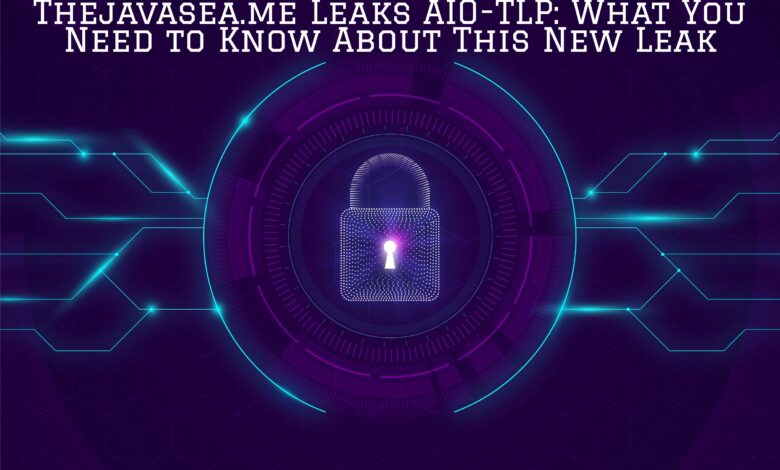Thejavasea.me Leaks AIO-TLP: What You Need to Know About This New Leak

In recent years, the internet has brought many benefits, but it also comes with increasing security concerns. Among these, data breaches and leaks stand out as one of the most alarming issues. Recently, a leak associated with the site “thejavasea.me” has gained significant attention. The term “AIO-TLP” has sparked curiosity about its meaning, how it happened, and its potential consequences. In this article, we will explore thejavasea.me leaks AIO-TLP, discussing its implications and what it means for users and organizations alike.
Understanding Data Leaks
To grasp the significance of thejavasea.me leaks AIO-TLP, it’s crucial to first understand data leaks in general. A data leak occurs when sensitive information becomes exposed, whether intentionally or unintentionally. This can happen for several reasons, such as security flaws, human errors, hacking, or poorly configured systems.
Data leaks differ from data breaches, which usually result from targeted attacks. Leaks can happen when sensitive data is stored in an unprotected location or accessed in unintended ways. This makes leaks particularly dangerous, as they can remain unnoticed for a long time, only being discovered when the damage has already occurred.
What is thejavasea.me?
Thejavasea.me seems to be a relatively unknown website. However, like many such sites, it could be prone to security vulnerabilities or might even host unauthorized data. Based on early reports, thejavasea.me may be involved in distributing sensitive information, causing concern for both individual users and cybersecurity professionals.
But what about the “AIO-TLP” part? This is where things become more complex and interesting.
Decoding AIO-TLP
The term “AIO-TLP” appears to refer to a combination of two distinct concepts:
- AIO stands for “All-in-One.” In the context of data leaks, this often refers to a comprehensive dump of various types of information. It might include email addresses, passwords, personal identification details, and more, all collected into one place.
- TLP stands for Traffic Light Protocol, a method used by cybersecurity professionals to categorize the sensitivity of information. TLP uses four colors:
- Red for highly sensitive information meant for specific recipients,
- Amber for somewhat sensitive information meant for limited distribution,
- Green for information that can be shared within a group,
- White for information that’s publicly available.
Together, the term AIO-TLP in the thejavasea.me leaks suggests the leak may involve an organized, possibly illegal, collection of sensitive data that has been improperly classified and shared.
How Did thejavasea.me Leaks AIO-TLP Happen?
While the exact details behind the thejavasea.me leaks AIO-TLP remain unclear, we can hypothesize a few likely causes based on past leak cases:
- Exposed Databases:
Data leaks frequently occur when databases are not properly secured. If thejavasea.me had access to sensitive databases and failed to protect them, they could have been exposed to the public. Common causes include misconfigurations, such as leaving databases unprotected or allowing unauthorized access. - Hacking:
Cybercriminals constantly target websites that store sensitive data. If hackers compromised thejavasea.me, they might have accessed and leaked the data. Hackers look for vulnerabilities in websites, especially those that may store valuable data like AIO-TLP, making the site a prime target. - Insider Threats:
A more subtle yet equally damaging cause could be an insider leak. Someone with legitimate access to the data might have intentionally released it. This type of leak can be more difficult to detect since the individual would typically have authorization to handle the information.
Potential Consequences of thejavasea.me Leaks AIO-TLP
The ramifications of a leak like thejavasea.me leaks AIO-TLP could be vast and damaging. Here are some of the possible outcomes:
- Impact on Individual Users:
If the leaked data includes personal information, users could be vulnerable to identity theft or phishing attacks. The leaked details might include email addresses, passwords, financial information, or other private data. Victims of identity theft often face a long and arduous process to regain control of their accounts and protect their identities. - Impact on Businesses:
If companies were affected by the leak, they might face severe consequences. Leaked customer data or proprietary information can cause financial losses, legal problems, and a damaged reputation. Customers may lose trust in companies that fail to safeguard their personal data, leading to long-term business repercussions. - Government Implications:
If the leak involves government data, it could lead to even more serious consequences. Government agencies are often entrusted with sensitive information, including state secrets. If such data is exposed, it can have national security implications. Even less sensitive government records can cause significant issues when leaked.
Steps to Protect Yourself from Data Leaks
With leaks like thejavasea.me leaks AIO-TLP becoming more common, it’s essential to take steps to protect your data. Here are some practical measures you can implement:
- Use Strong, Unique Passwords:
One of the easiest ways to safeguard your information is by using strong, unique passwords for each account. This way, even if one account gets compromised, hackers won’t be able to access your other accounts. - Enable Two-Factor Authentication (2FA):
Two-factor authentication adds an extra layer of security to your accounts. It requires you to provide a second form of identification, like a code sent to your phone, in addition to your password. This makes it much harder for unauthorized users to access your accounts. - Monitor Your Accounts Regularly:
Stay vigilant by monitoring your accounts for any unusual activity. If you notice anything suspicious, such as unauthorized logins or changes to your personal information, take immediate action to secure your accounts. - Stay Informed About Breaches:
Keep yourself updated on the latest breaches and data leaks by signing up for breach alert services. These services notify you if your personal information has been exposed, allowing you to take prompt action. - Encrypt Sensitive Information:
Businesses and organizations should consider encrypting sensitive data. Encryption ensures that even if data gets leaked, unauthorized individuals won’t be able to read it without the decryption key.
What Lies Ahead for thejavasea.me Leaks AIO-TLP?
As the story of thejavasea.me leaks AIO-TLP continues to evolve, it’s vital to stay informed and prepared. Investigators are still piecing together the full details of how the leak occurred and what the consequences might be. In the meantime, both individuals and organizations should focus on securing their data and reducing the risk of becoming the next victim of a leak.
Read more: Lakers vs Portland Trail Blazers Match Player Stats and Game Highlights
Conclusion
Thejavasea.me leaks AIO-TLP serve as a harsh reminder of the growing risks in our increasingly connected world. This particular leak involves sensitive, all-in-one data that, if misused, can harm individuals, businesses, and governments. The circumstances around the leak are still emerging, but the key takeaway is clear: protecting data is more important than ever.
By adopting basic security practices such as strong passwords, two-factor authentication, and regular monitoring of accounts, individuals can reduce the chances of falling victim to future leaks. Likewise, businesses must prioritize securing their data through encryption and diligent monitoring to prevent similar situations.
As the digital landscape continues to evolve, being proactive and vigilant is crucial for keeping your data secure.



